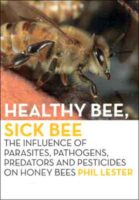‘Impeccably researched … The story is told with immense style’ Prof. Ben Oldroyd, University of Sydney
Phil Lester’s first book, The Vulgar Wasp, was about one of the world’s most hated insects. His second is about just the opposite – the honey bee, arguably one of our best-loved six-legged creatures. People have revered honey bees for centuries. Today we celebrate them with toys, postage stamps and campaigns to raise awareness; we dress up in large bee suits to protest the use of pesticides; we’ve even sent bees into space and watched as they adjusted to microgravity.
Bees are one of the world’s most efficient pollinators. Their work is vital to the success of many food crops, and hence to the world’s yconomy. So we need to take seriously any threat to their health – including parasites, pathogens, predators and pesticides – and, guided by evidence at every turn, find a way to minimise harm and keep bees thriving. As Healthy Bee, Sick Bee shows, this is no small task.
Entomologist Phil Lester explores the wonderfully complex and sometimes brutally efficient life history of honey bees, and the problems they face in New Zealand and around the globe. What causes a beehive to collapse? Are pesticides as big a problem as they appear? What can we do to improve the health of our honey bees? With intelligence, insight and entomologist jokes, Healthy Bee, Sick Bee tells the story of this much-loved little insect and offers new ways of thinking about how to ensure they will stick around in the future.
Phil Lester is a Professor in Ecology and Entomology at Victoria University of Wellington. He is the author of The Vulgar Wasp (VUP, 2018) and has published more than 140 articles on invasive ants, bees and wasps and other insects in journals that include Biology Letters, Ecology, and Proceedings of the Royal Society. Phil sits on the editorial boards of several journals, including Biological Invasions. He has won Fulbright and Royal Society Te Apārangi James Cook Research Fellowships.



